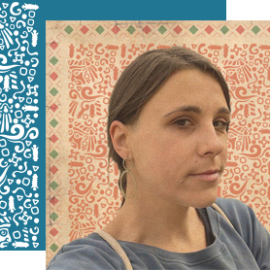Team

Katarzyna Szoblik (Principal Investigator)
University of Warsaw
Although I am fascinated by all Mesoamerican cultures, both pre-Hispanic and contemporary, my research work focuses mainly on the collection of the Nahuatl songs, collected in the sixteenth-century manuscript entitled Cantares mexicanos. In my Ph.D. thesis, elaborated in the framework of the project Woman as a subject and as a composer of the ancient Nahua songs (2011-2014), I proposed an interpretation of three songs from this collection. Once I had realized the richness and depth of symbolic meanings hidden in these texts, I continued working on a larger corpus, focusing on the songs dedicated to historical themes and developing the research project Cultural topoi in the pre-Hispanic and early colonial oral tradition of Central Mexico (2018-2022). Currently, with a group of renowned scholars from Mexico, the United States, and Poland, I am developing a project dedicated to Christian chants compiled in Cantares mexicanos, entitled In the Tlalocan of Saint Francis - religious syncretism and intercultural dialogue in the Christian texts of “Cantares Mexicanos” (2022-).

Benjamin Johnson
University of Massachusetts
It is an absolute honor to join such talented colleagues in this project! I’m just completing an NEH-funded investigation of the Codex Xolotl, together with Drs. Szoblik and Madajczak among other colleagues, which will soon appear in both print and online at codexxolotl.org. Before that, I published a book on Nahua tlaxilacalli (Pueblos Within Pueblos, 2018) and translations of early Nahuatl documents from Texcoco, Mexico (Documentos nahuas de Tezcoco, vol. 1; edited by Javier Eduardo Ramírez López, 2018). In this current project, I am particularly interested in the historicity of the Cantares mexicanos—what they say about time and place; and, conversely, how context can help ground these songs in webs of local meaning. Part of this context is, of course, other documents produced in Central Mexico in the same period as the Cantares mexicanos; and, in this connection, the hieroglyphic Codex Xolotl could be a particularly interesting comparison.
https://um-boston.academia.edu/BenjaminJohnson

Ewa Kubiak
I have a PhD in art history and since 2002 I have been working at the Institute of Art History at the University of Lodz. Since 2017 I collaborate closely with the Center for Andean Studies of the University of Warsaw in Cusco. I focus on colonial art in Latin America. I am interested in relations between colonial institutions and art, private collections in the light of wills, ephemeral art. I am also dedicated to the iconography of Peruvian and Novo-Hispanic art of the XVI, XVII and XVIII centuries.
https://lodz.academia.edu/EwaKubiak
https://www.researchgate.net/profile/Ewa-Kubiak-2

Julia Madajczak
University of Warsaw
I was always fascinated by the "Aztecs." Ever since my M.A. in archeology, through my second M.A. in cultural anthropology, my Ph.D. in cultural studies, and subsequent projects, I have been looking for ways to study the pre-Hispanic and Colonial culture of the Nahua. Until now, I have participated in several research projects, among them Europe and America in Contact: A Multidisciplinary Study of Cross-Cultural Transfer in the New World Across Time (2013–2017), directed by Justyna Olko, and The Corpus Xolotl Project: Indigenous History and Performance in Aztec and Colonial Texcoco, Mexico (2019–2021), directed by Benjamin Johnson. My research projects have added to this variety in themes: A Lost Nahuatl Census of the Jagiellonian Library in Poland: Translation and Critical Edition of the Sixteenth-Century Manuscript (2017–2020) and Metaphors as a Key to the Pre-Hispanic Nahua Worldview: A Multidisciplinary Approach (2020– ). I find every aspect of Nahua culture intriguing. However, what currently excites me the most is the deconstruction of the Christian vision of the Nahua, inscribed in texts written by the Spanish friars, and the reconstruction of Pre-Hispanic Nahua beliefs.
https://uw.academia.edu/JuliaMadajczak
https://www.researchgate.net/profile/Julia-Madajczak

Miguel Figueroa Saavedra
University of Veracruz
I have an interest in the study of Nahuatl culture and language—both in how it was in the past and it is nowadays—from several disciplines: missionary linguistics, historical lexicography, Nahuatl literacy, sociolinguistics, and language planning. I received the B.A. in Anthropology of America and the Ph.D. in Social Anthropology. During my teaching and research activity I have been working in several projects like Estudio diagnóstico sobre las prácticas comunicativas vigentes en las comunidades de habla indígena en México (INALI, UV, 2015), Vocabularios bilingües hispano-mexicanos de Alonso de Molina (UMA, UV, 2016- ); or Storybooks Mexico (UASLP, 2022- ). Some publications: Lilia Irlanda Villegas Salas & Miguel Figueroa Saavedra, “Traducción de elementos eucarísticos al náhuatl: activación modernizadora e intercultural” (SENDEBAR, 2022), “La traducción de las especies eucarísticas al náhuatl: un episodio de la historia de la traducción en Nueva España” (Revista Española de Antropología Americana, 2020); In yewehkatlahtoh Cristóbal del Castillo. Masewalli akin ahmo tlalkawasnekiya (CENEJUS-UASLP; 2016); “Tendencias, criterios y divergencias en la traducción de un antiguo canto nahua”, (Chapter in Ideologías en traducción. Literatura, didáctica, cultura, 2016); Xopancuicatl. Cantos de lluvias, cantos de verano. Estudio y edición bilingüe de cantos en náhuatl (UV, 2010).
https://independent.academia.edu/MiguelFigueroaSaavedra
https://www.researchgate.net/profile/Miguel-Figueroa-Saavedra
Miguel Figueroa-Saavedra Ruiz – Sitio personal (uv.mx)

Katarzyna Granicka
I work at the University of Warsaw, in the Center for Research and Practice in Cultural Continuity, at the faculty of “Artes Liberales”. I have a PhD in culture studies, my thesis was dedicated to the 1548 Dominican catechism in Nahuatl – Doctrina Christiana and the creation of the Christian terminology in Nahuatl. I’m interested in Nahuatl and the cultural and linguistic change that occurred in colonial New Spain, especially right after the conquest. I work at the project dedicated to researching the indigenous cultural trauma and agency in New Spain and I currently begin working in the project about the struggle for land in Tlaxcala, through the ages.
